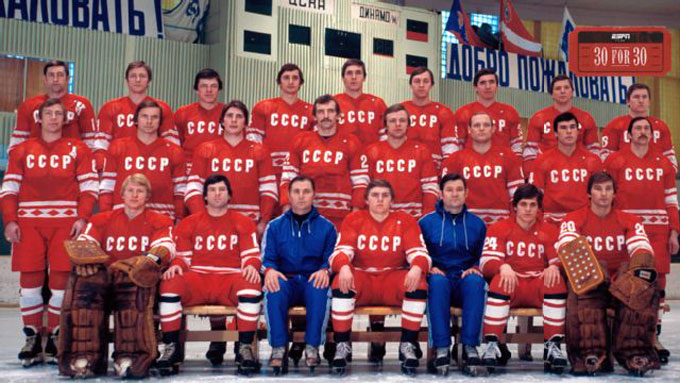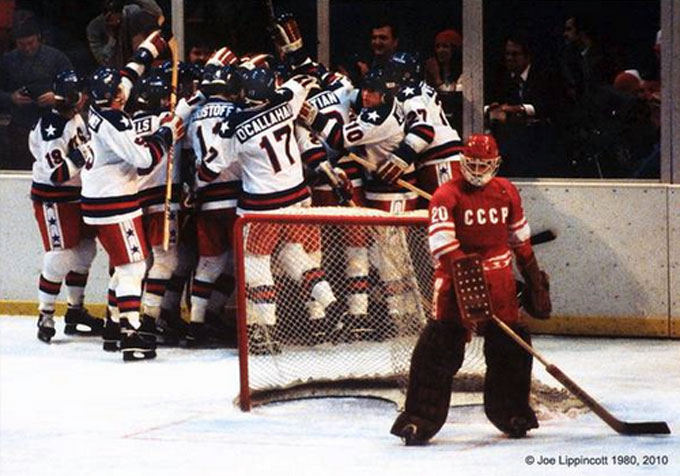35 Years Later, Soviet Get to Tell Their Side
by Andrew Kulyk and Peter Farrell


Has it really been 35 years?
Even the most casual sports fans can still get the goose bumps, can still feel the chills, can still get choked up, watching that amazing game and improbable outcome which took place in Lake Placid on February 22, 1980.
The severely under-talented group of Americans, squaring off against the mightiest hockey machine on the planet, a Russian squad which had faced down the best of the best in the NHL and dispatched them, sometimes with ease. The USSR team came to these Olympics amidst a backdrop of huge geo-political tensions. The Cold War was threatening to go hot; The Soviets had invaded Afghanistan. Oil shocks had decimated the western economy. Inflation was rampant. As was unemployment. Americans were looking for a respite from all the miseries and grim news, and on one magical Friday afternoon they found it.

What was most memorable was Soviet coach Viktor Tikhonov pulling his all world goaltender, Vladislav Tretiak after one period, following Tretiak’s allowing a softee as time expired in that frame. Then the USA netting two goals in the third period to take a 4-3 lead, and holding on for dear life as the Soviets pummeled the Americans with wave after wave of attack. The final seconds ticked down, and ABC broadcaster Al Michaels bellowed, “Do you believe in miracles? Yes!”

Feeling the chills again? Good.
But what about the Russians? Amidst all the pomp and glory felt here in our country, a group of young men dubbed the “Big Red Machine” had to go back to their homeland as the runners up. This month, their story is being told via an ESPN documentary, Of Miracles and Men, and a feature film set to debut next month, titled Red Army.
Of Miracles and Men chronicles the growth of the Russian hockey program as shaped by the passion and genius of Anatoli Tarasov, who shepherded the sport for decades. But much of the documentary, and the feature film, is explained through the narration of Soviet superstar Viacheslav “Slava” Fetisov, who had a stellar career in both Russia and here in the US, winning two Stanley Cups with the Detroit Red Wings.
Fetisov has found a new career in the post hockey world in government and politics. He served as the Minister of Sport for the Russian Federation, and now sits as a member of the upper house in the Federal Assembly of Russia.
He is a close friend of Russian Federation President Vladimir Putin and unabashed supporter of his policies, including the proxy war being fought against the people of Ukraine. In a recent interview, he shamelessly proclaimed that there is no persecution of Russia’s LGBT community, despite overwhelming evidence to the contrary, including new vague and sweeping laws passed by his own house criminalizing “homosexual propaganda.”

So it was a bit ironic seeing Fetisov and his daughter Tatianna at center ice in Lake Placid, reliving the Miracle on Ice from his perspective. He admitted that he remembered every detail of just about all of his signature career accomplishments, yet that game and that day at the Winter Olympics remains something of a blur.
And then the dogmatic Fetisov, who remains silent and resolute about his country’s shrinking liberties and bombastic military adventurism, revealed his personal pain as he attempted to move to the United States and become an NHL player.
New Jersey Devils general manager Lou Lamierello was aggressively pursuing Fetisov to come play for his team. For Fetisov, it would mean fame and riches that were unheard of if he continued to play for the Central Red Army team and collect his meager soldier’s wages.
What happened next was a series of diplomatic maneuvers which Cold War legends are made of. To be allowed to emigrate to America, Fetisov would have to win a release from service in the army, which was ridiculous since he was a member in name only, and never actually brandished a weapon or served in combat. The army was unwilling to do that, and the complications got so bad that Lamierello was actually scheming to have Fetisov defect.
In the midst of all this Fetisov, and his family, had to endure his own trials and persecutions, which included his arrest and brief incarceration. All for just trying to market his skills on a worldwide stage. Fetisov glosses over this dark chapter of his career in the documentary, but more details of the purges he suffered at the hands of the regime have been widely told.
There is more. Vladislav Tretiak shares his perspective from hollow eyes, quitting in 1984 after not being able to take any more of Coach Tikhonov’s KGB style of leadership. Superstar Valeri Kharlamov’s story is far more tragic; he was thrown off the team just prior to the 1981 USSR-Canada Summit Series, presumably for demanding more autonomy and freedom. Days later, he and his wife perished in a car crash under very mysterious circumstances.
Watch the documentary. See the movie. While Americans were dancing in the streets on that February day in 1980, we now get to see the Russian version—the Soviet TV broadcaster somberly announcing that their men would not be successful on that day. And within 30 seconds of the final horn, the telecaster signed off.
blog comments powered by Disqus|
Issue Navigation> Issue Index > v14n7 (Week of Thursday, February 19) > 35 Years Later, Soviet Get to Tell Their Side This Week's Issue • Artvoice Daily • Artvoice TV • Events Calendar • Classifieds |









 Current Issue
Current Issue